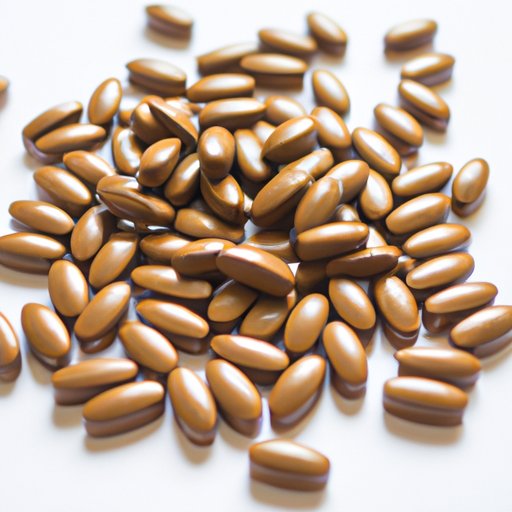
Introduction
Biotin is an essential B vitamin that plays a crucial role in many important bodily functions, including the metabolism of carbohydrates, fats, and proteins. It is also known for its potential benefits for hair, skin, and nail health. However, the confusion around how much biotin to take daily can be overwhelming for many people seeking to reap these benefits. In this article, we will explore the science behind biotin supplementation and provide a complete guide to optimum dosing.
The Benefits of Biotin: How Much Should You Take Daily?
Biotin, also known as vitamin B7, is a water-soluble vitamin that is necessary for the proper functioning of the body. It helps to convert food into energy and plays a key role in the synthesis of fatty acids, glucose, and amino acids. In addition to its metabolic benefits, biotin has also been linked to improved hair, skin, and nail health.
The recommended daily intake of biotin for adults is 30-100 micrograms. Good dietary sources of biotin include eggs, nuts, legumes, and whole grains. However, many people choose to take biotin supplements to ensure they are getting enough of this important nutrient.
The Dos and Don’ts of Biotin Supplementation: Optimal Daily Intake
When it comes to biotin supplementation, there are a few dos and don’ts to keep in mind to ensure optimal daily intake. It is important to consider factors such as age, gender, and overall health status when determining the right dosage.
It is also important to avoid mega-doses of biotin, as excessive amounts can lead to potential side effects such as acne, digestive issues, and allergic reactions. Follow recommended guidelines and choose high-quality biotin supplements from reputable brands.
Unlocking the Science of Biotin: A Complete Guide to Optimum Dosing
Research on the benefits of biotin supplementation has been mixed, with some studies showing no significant effects and others showing positive results for various health conditions. However, the potential risks of biotin deficiency and the role of supplements in preventing or treating these conditions cannot be ignored.
Recent studies have focused on determining the optimum dosage of biotin for specific health outcomes, such as hair, skin, and nail health. The results suggest that higher doses may be more effective for these purposes. However, it is important to consult with a healthcare professional before increasing your biotin intake beyond recommended guidelines.
The Side Effects of Overdosing on Biotin: Safe Levels to Take Daily
While biotin is generally considered safe and well-tolerated, taking too much can lead to potential side effects such as nausea, diarrhea, and skin rash. It is important to follow recommended guidelines for safe biotin supplement use and avoid excessive doses.
Biotin supplements can also interact with certain medications, so it is important to talk to your doctor before starting any new supplement regimen, especially if you are taking medication for a health condition.
Biotin Supplements: How Much is Too Much and How Much is Too Little?
Inadequate biotin intake can lead to a range of health issues, including hair loss, skin rash, and neurological symptoms. Determining the correct biotin dosage based on individual needs and concerns is essential to ensure adequate intake and prevent deficiencies.
However, excessive biotin intake can also lead to potential risks, including interference with lab test results and medication interactions. It is important to find a balance and moderation when it comes to biotin supplementation.
The Importance of Getting the Right Dose of Biotin: Understanding the Daily Recommendations
Getting the right dose of biotin is essential for optimal health and wellness. Understanding the daily recommendations and dos and don’ts of biotin supplementation can help you to make informed decisions about your supplement regimen.
Consulting with a healthcare professional before starting any new supplement regimen is always recommended. Trustworthy sources, such as the National Institutes of Health and reputable supplement brands, can also provide helpful information about biotin and its benefits.
Conclusion
By understanding the science behind biotin supplementation and the dos and don’ts of daily intake, you can take charge of your health and wellness. Getting the right dose of biotin can help to support metabolic function and improve hair, skin, and nail health. Take the time to do your research, consult with a healthcare professional, and choose high-quality biotin supplements to ensure you are getting the most out of this important nutrient.





